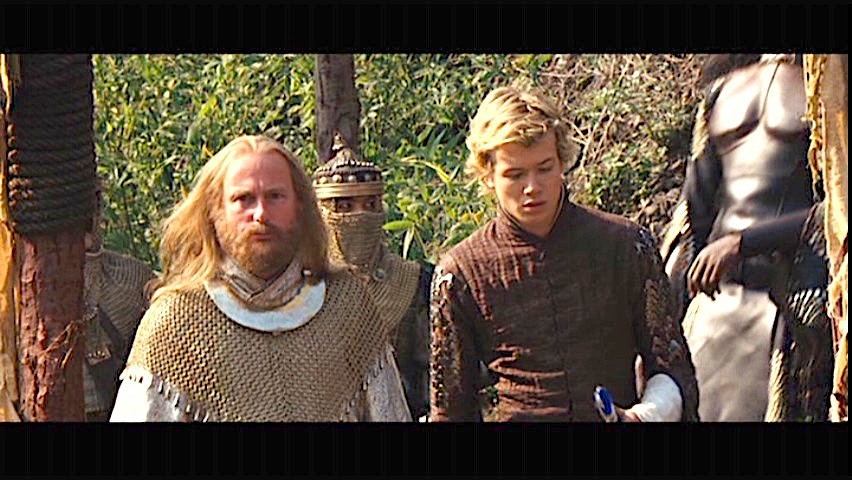Photo: Ed Speleers and Gary Lewis in Eragon (2006), hotflick.net
Those of you who frequent this blog know I bang on about elevating not only girls and women, but boys and men. My husband and I are raising one of each right now, and my experience, in my predominantly white upper middle class, highly educated community, is that the girls are thriving, the boys, less so. I am all for elevating girls, and women, but let’s not forget our boys, and men.
I’ve been Rubik’s cubing this one for years now. The books by Michael Gurian The Wonder of Boys, and The Wonder of Girls (which I am currently reading), have been a tremendous influence. Gurian does research into human nature, over thousands of years, and across myriad cultures, taking into account brain development, hormonal, physiological, psychological, environmental and neurological factors to come up with his theories. And they make sense to me. Girls and boys are inherently different, but different does not mean better or worse. (By the way, I think these books should be required reading for all moms, mums, dads, da’s, grannies, grans and grand da’s).
I look at Trump, and my dad, and a lot of men that age, and here’s what I see: boys who were completely cut off from their emotional experience, and resources, taught to ignore this vital part of themselves by their environment, their training. This is the form of oppression boys and men have experienced for centuries, and it does not serve them (or anyone).
When I watched Ed’s video about this project, I felt so elated. It’s an Outlander in Other things, it includes one of the more amazing humans I’ve ever met: Gary Lewis, and it addresses this very topic. And not only that, I recently attended the celebration of a Bar Mitzvah whom I watched eulogize his own father 6 years ago, at the heart breaking tender age of 7 and a half. Oh, and his name is Matthew.
I contributed to this project. Watch the video, and back the project if you like, for your own reasons. I am thrilled to see this work being done, and talked about. I look so forward to it.
Click on the K in the upper left corner to make a donation.









Beautifully said, Courtney! I agree 100%
I saw his Instagram post and wondered… thank you for bringing this project to more of our attention. I have a daughter who lost her dad at the age of 12. I would love for her to one day meet a guy who is as emotially intelligent as she is. Will definitely be contributing to this project.
As a mom of two grown boys, I’m happy to contribute to projects such as this. I love my kind and soft hearted sons and understand what a difficult and confusing landscape they have to navigate. Bravo to Ed and thanks for bringing it to our attention.
Dear Courtney
It is with some trepidation I respond to this post because I don’t wish to be a thorn in anyone’s side. But, I must disagree with Dr. Michael Gurian’s premise that male and female brains are inherently different. Gurian is a proponent of the “single-sex academic classes” movement. He also believes gender differences influence learning. Thus, he has an agenda.
If a researcher starts with inherent assumptions and prejudices, they will interpret data in ways that support said prejudices. This approach is antithetical to the nature of basic science research wherein the researcher starts by eliminating as much bias as possible and attempts to sustain this throughout the study (I did basic science research for 25 of my 36 year medical career).
It happens that the March 2-8, 2019, issue of “New Scientist” features the cover story : “Do Women and Men have Different Brains?” Authored by Dr. Gina Rippon, a cognitive neuroscientist at the University of Aston in Birmingham, UK, the short answer is no significant differences can be demonstrated using the latest imaging and computer technology. She offers compelling evidence that the concept of a female brain and a male brain is outdated and inaccurate because research shows that every person’s brain (regardless of sex) is unique. The brain we are born with is not the brain we end up with! Assuming absence of disease, injury, deprivation, etc., each brain is constantly adapting and changing (neuroplasticity) based on rearing, family relationships, beliefs, injuries, disease, experiences, travel, education, hobbies, acquired skills, etc.
The hunt for sex differences in the brain is a long tradition starting with phrenology in the 19th century. Because women’s brains are on average 5 ounces lighter than men’s brains, they were deemed inferior (no evidence exists that bigger brains are better brains). For the last 200 years, that assumption has propelled researchers to “see” differences between male and female brains but, these conclusions do not withstand scientific scrutiny.
A couple of recent publications offer clarity. In 2015, a review of more than 20,000 studies into behavioral differences, compiling data from more than 12 million people, found differences between men and women over a wide range of characteristics such as impulsivity, cooperativeness and emotionality were vanishingly small. In the same year, a study by Daphna Joel at Tel Aviv University examined more than 100 brain scans and found it was impossible to divide these into female-typical or male-typical brains. Each brain, regardless of gender, was a mosaic of different characteristics , some traditionally considered “male” and some considered “female.”
For centuries, women have been sacrificed to promote the status of men. Perhaps nowadays, we are in danger of sacrificing men to promote women? Neither choice is acceptable. My personal belief is that a just society encourages each member to reach full potential regardless of the nature of the reproductive organs.
Bottom line: I hope you will reconsider Dr. Gurian’s “men are from Mars; women are from Venus” approach as the last word on this topic because current hardcore research suggests otherwise.
Hugs,
Karmen
The deeply grateful, Outlander Anatomist
My dearest Karmen, you are never a thorn in my side! I welcome your very educated opinion and comments, always, and I am always OK being given new information, even if it means I am mistaken. I would love to discuss this more with you. As I wrote this piece today, I did have the thought that these books were published some time ago. But, I do also find a lot of timeless applicable wisdom in Gurian’s books. Perhaps he is a better social observer than researcher, and clearly his brain research is out of date, but his opinions are formed by more than just brain data. Maybe female and male brains have become less different over time due to neuroplasticity? ? Whatever the case, I still find value. Have you read the books? Let’s discuss! To be continued! Hugs and kisses. xo
There is absolutely a difference between men and women…that’s why we have men and women. In any case, I agree, men have been taught to guard their emotions. I also believe, although I am definitely for gender equality when it comes to certain things (like a woman having the same opportunities and getting paid the same as a man, etc…), but I also think we are taking away some of the qualities that make good men. I believe I am a strong woman. My parents are divorced and I watched my mom’s be devastated by the loss of her marriage. I vowed I would NEVER rely on anyone but myself. I can say, I think this has made my marriage harder because I don’t allow my husband to be valued. Men need respect. Women need love. Men need to “take care” of their women. Women need to allow men to take care of them. The best book to look to when seeking any data, in my opinion, is the bible. Yup…it’s in there. Cheers to Ed and crew. Well done.
There’s a lot of wisdom in your comment Christine. And honesty. I think we all tend to be reactions to our upbringing, which usually brings a bunch of trade offs. And I agree with you. Men are so wired to take care of their women, and when not allowed to, they seem lost and unfulfilled. Imagine if our babies didn’t allow us to follow our instincts and nurture them?? Independence vs interdependence- I deal with this too. x
i do not agree i think women are not raising MEN anymore we are raising pansies
Well, I think there’s often a pendulum effect that goes on – have to find the extremes before one can find the middle. I think nurturing makes for stronger people in the end.